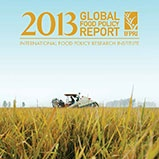Tag: International Food Policy Research Institute

Can Changing Our Diets Change Our Climate?
Global: Dr. Fanzo of Johns Hopkins University highlights calls-to-action set out in the Global Nutrition Report 2015.
Read MoreIFPRI: Resilience of Smallholders Should Be Key Theme in Sendai
Global: Why should the World Conference on Disaster Risk Reduction consider smallholder farmers?
Read MoreHighlights from IFPRI’s 2013 Global Food Policy Report
Global: This week, the International Food Policy Research Institute (IFPRI) launched its 2013 Global Food Policy Report, reviewing major trends and developments from the past year, and setting an agenda for action for 2014 and beyond. Whilst post-2015 development discussions are focusing on eliminating extreme poverty by 2030, the report argues that ending hunger and undernutrition […]
Read More


